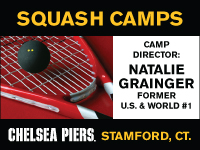Alister Walker In Straight Games Over Tom Richards To Capture $35K PSA Berkshire Open Title
by Zafi Levy

April 15, 2012 - The completed draw for the 2012 True North Berkshire Open in the foyer of the Williams College Chandler Athletic Center was filled in this afternoon as it was scripted, with the name of the top seed, Alister Walker, stenciled in on the line farthest to the right. In front of an appreciative, mid-afternoon gallery, he performed brilliantly in taking the eighth running of this tourney and its fourth on the glass tour court, in three hard-fought, but rather routinely scored games; 11-8, 11-7, 11-7 in 44 minutes.
For those in the audience who had watched Alister survive the two hour and eleven minute bloodbath that was his semi-final the night before against Borja Golan, not one (not even Alister’s most ardent supporters) would have predicted that he would’ve been able to revive himself less than 24 hours later to play at this level for even one game, let alone three. And then, if you had heard—after the match for some, here for others—that Alister’s post-match therapy the night before included an ice bath causing a full body seizure (aka extreme, sometimes critical dehydration), you might not have been surprised if he had been unable to play at all.
Tom Richards played just fine, but what he did not realize at the time was that he was the foil in a drama whose script was already predetermined. He is a consummate professional—a skilled and dedicated craftsman in the art of squash. His game plan was solid: keep the rallies long; when in doubt send the ball deep; attack only when necessary, and then without risk of error. After all, it was “obvious” that the longer Alister was forced to play at this tempo, the better his odds were to totally exhaust him and drain whatever resources he had left—embark on a war of attrition and wait for it to work. There was just no way that Alister could sustain the effort required to deal with a relatively fresh (remember the last two games of Tom’s semi the night before where perfunctory affairs, with Julian Illingworth injured and unable to generate a physically demanding level of play), fully invested and seasoned competitor of Tom’s level.
Except that turned out not to be the case. Not by a long shot.
After hundreds of millions of practice hours, billions of rails, a ga-billion court sprints, there is—in truth—that perfect zone: where true exhaustion dulls the decision-making of fear and anxiety; where muscle memory responds inexplicably and without the often flawed and interfering process of decision-making to hinder; to a physical challenge with strength and endurance stored somewhere accessible only through a counter-intuitive process of total relaxation and absence of decision-making; where strategic choices are governed, not by untrustworthy decision-making, but by instinct and feel; and, where the brain and the body are both so tired that not an ounce of expectation or fear-of-losing retards the competitive, decision-making process. It is quite literally, an athletic phenomenon—on the scale and frequency of the arrival of Hayley’s Comet—that can only be described as “auto-pilot.”
So, the result, but more than that, Alister’s play, could not have been predicted. Tom Richards was part of a drama in which he had no role except as bystander. Alister’s play was just at too high and uncompromising a level: no errors, fluid movement and recovery of position, unerring shot selection, nerveless execution of feathery drops, accuracy down both walls that left nothing loose, kill shots that found the nick or laid low into the side-wall crease, and the unfolding reality that each point would be a replay of the one before—that there would be no deterioration in quality, no matter what the length of the rally or the elapsed time of the match.
In a professional lifetime of 10 years, maybe this happens once, maybe twice—maybe never. And, if it does happen, it can’t ever be predicted, reproduced or saved for a later date: the serendipitous combination of circumstances and considerations mixed together in a nuanced web of perfection are way too random to ever predict, forecast or anticipate. Literally and figuratively, one in a million.
But, if the squash forces combine, as they did for Alister Walker this afternoon, the outcome will have been a magical mystery ride for the winner and a no-hope death march for an opponent.
Thanks to everyone involved for bringing the glass court and these remarkable players to Williamstown; thanks to Dalit Lederman for decorating a basketball court so that it looks better as a squash venue; and thanks to Rob Able at True North (and, at least one other guardian angel whose name I’m not allowed to mention) for his continued and unwavering support. Let’s hope all of this comes together again next year.
2012 Berkshire Open: Day #5 (of 5): Finals
Walker def Richards: 11-7, 11-8, 11-8 (44 minutes)
DRAW
Back To Main


